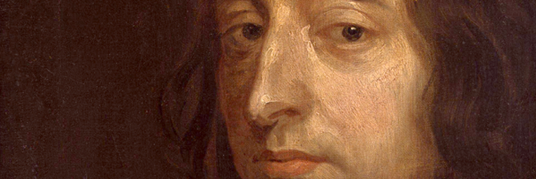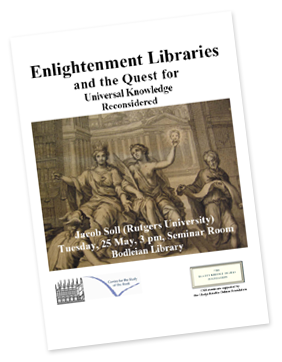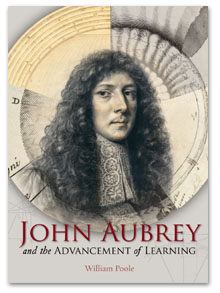You are viewing the Cultures of Knowledge Blog archive for the ‘Publications’ Category:

The Project is delighted to announce the presentation of transcriptions of almost all of the surviving correspondence of the jurist, historian, Hebraist, and polymath John Selden (1584–1654). The transcriptions have been generously provided by Professor Gerald J. Toomer, who prepared them (originally for his own research purposes, not for publication) in the course of the research for his magnum opus John Selden: A Life in Scholarship (Oxford: Oxford University Press, 2009). Selden, many of whose letters survive among the holdings of the Bodleian Library, was widely regarded as the most important scholar in Britain in the seventeenth century. He was a major antiquary and historian of English law, whose work was unrivalled before Maitland in the nineteenth century. He was also a central figure in the transmission of Oriental learning to the West, and was acknowledged in his lifetime as one of the greatest Christian authorities on Jewish law and history. He encouraged the study of Arabic, and produced the first English edition of an Arabic text. He was also an internationally recognised theorist of international law (in his Mare Clausum) and natural law (De Iure Naturali et Gentium). His works were caught up in many of the most controversial religious and political issues of the day, provoking praise and polemic in Britain and Europe. His correspondence network extended to northern Europe and eastwards to Aleppo.
The discussions which led to Professor Toomer’s generous agreement to the presentation of these transcriptions on our website were initiated at and facilitated by the international conference John Selden, 1584-1654: Scholarship in Context (Magdalen College, Oxford, 24-26 June 2010), organized by Thomas Roebuck and Jeffrey Miller in association with the Centre for Early Modern Studies and the Centre for the Study of the Book.
The transcriptions will be available in a fully searchable form within our union catalogue at its launch in September 2011. In the interim, we are pleased to be able to provide them as a pdf file (13.5 MB).
Please note that the copyright of the transcriptions remains with Professor Toomer, and that you should not quote from them in papers or scholarly publications without prior written permission (please contact the Project in the first instance). Professor Toomer would also like it to be emphasised that the document is not a conventional scholarly edition, and should not be judged by those standards; the transcriptions were prepared for private use rather than for publication, and in most cases have not been checked against the originals.

Bodleian Library, Lister Copperplates 858 (plate 787), Conus Marmoreus

When it came time to publish Historiae Conchyliorum, Lister also called upon the scientific and artistic expertise of his two daughters, Susanna and Anna Lister, who were the primary draftswomen for the copperplates and who may well have been the first women to use a microscope to assist them with their scientific illustrations.
Susanna and Anna’s copperplate etchings and other scientific drawings are currently being featured in an article and slideshow on the news page of the journal Nature, and the women’s role in early science is one of the topics discussed in Roos’s forthcoming biography of Lister, Spiderman: Martin Lister (1639-1712), Naturalist and Physician.
A collection-level description of Martin Lister’s manuscripts in the Bodleian, as well as a description of Martin Lister’s books now held by the Bodleian, are available on the library’s website. The copperplates are kept in preservation envelopes and individual plates can be located using a handlist available from the Bodleian Rare Books Section (rare.books(at)bodleian.ox.ac.uk).
 A lecture by Jacob Soll on ‘Enlightenment Libraries and the Quest for Universal Knowledge Reconsidered’ will take place at 3pm on Tuesday 25 May in the Seminar Room of the New Bodleian Library. Soll gained his doctorate in history at Cambridge University after completing a diploma of advanced studies at the École des Hautes Études en Sciences Sociales in Paris. His 2005 book, Publishing The Prince, about the afterlife and translations of Machiavelli’s work, won the Jacques Barzun Prize in Cultural History. Since then he has written about the birth of information culture in Europe, including research on the origins of state archives, on note-taking by early modern readers, on accountancy in seventeenth-century Holland, and the critical uses of historical evidence in early modern Europe. In 2009 he published The Information Master: Jean-Baptiste Colbert’s Secret State Intelligence System. Soll teaches at Rutgers University, New Jersey. He is a Consulting Editor of the Journal of the History of Ideas and a co-founder and Associate Editor of the new online journal Republics of Letters, founded at Stanford University with Dan Edelstein.
A lecture by Jacob Soll on ‘Enlightenment Libraries and the Quest for Universal Knowledge Reconsidered’ will take place at 3pm on Tuesday 25 May in the Seminar Room of the New Bodleian Library. Soll gained his doctorate in history at Cambridge University after completing a diploma of advanced studies at the École des Hautes Études en Sciences Sociales in Paris. His 2005 book, Publishing The Prince, about the afterlife and translations of Machiavelli’s work, won the Jacques Barzun Prize in Cultural History. Since then he has written about the birth of information culture in Europe, including research on the origins of state archives, on note-taking by early modern readers, on accountancy in seventeenth-century Holland, and the critical uses of historical evidence in early modern Europe. In 2009 he published The Information Master: Jean-Baptiste Colbert’s Secret State Intelligence System. Soll teaches at Rutgers University, New Jersey. He is a Consulting Editor of the Journal of the History of Ideas and a co-founder and Associate Editor of the new online journal Republics of Letters, founded at Stanford University with Dan Edelstein.
 Further to this post, Dr William Poole‘s correspondence-related lectures at the Museum of the History of Science and the Oxford Bibliographical Society last month have now been published online. ‘The Chinaman and the Librarian: The Meeting of Shen Fuzong and Thomas Hyde in 1687′ is available in full-text on ORA, while ‘Oxford and the Royal Society in the Seventeenth Century’ is available as a podcast on the MHS website.
Further to this post, Dr William Poole‘s correspondence-related lectures at the Museum of the History of Science and the Oxford Bibliographical Society last month have now been published online. ‘The Chinaman and the Librarian: The Meeting of Shen Fuzong and Thomas Hyde in 1687′ is available in full-text on ORA, while ‘Oxford and the Royal Society in the Seventeenth Century’ is available as a podcast on the MHS website.
 The intellectual contributions of John Aubrey, one of the best-connected scholars of the seventeenth century, a prolific correspondent, and a main focus of Cultures of Knowledge, will be brought to the fore in 2010. An exhibition entitled ‘‘My wit was always working’: John Aubrey and the Development of Experimental Science’, will run from 28 May–31 October 2010 in the Exhibition Room of the Bodleian Library. The exhibition is curated by Project participant Dr William Poole, who has also written a companion volume, John Aubrey and the Advancement of Learning. To be released by Bodleian Publishing on 1 May 2010, the Project is delighted to have been able to support the book, for which advance information is available here (doc) . The exhibition will also be accompanied by an ‘Aubrey Day’ on Saturday 19 June, and a series of lunchtime talks on Fridays throughout July and August; for full details, see here.
The intellectual contributions of John Aubrey, one of the best-connected scholars of the seventeenth century, a prolific correspondent, and a main focus of Cultures of Knowledge, will be brought to the fore in 2010. An exhibition entitled ‘‘My wit was always working’: John Aubrey and the Development of Experimental Science’, will run from 28 May–31 October 2010 in the Exhibition Room of the Bodleian Library. The exhibition is curated by Project participant Dr William Poole, who has also written a companion volume, John Aubrey and the Advancement of Learning. To be released by Bodleian Publishing on 1 May 2010, the Project is delighted to have been able to support the book, for which advance information is available here (doc) . The exhibition will also be accompanied by an ‘Aubrey Day’ on Saturday 19 June, and a series of lunchtime talks on Fridays throughout July and August; for full details, see here.

Detail from 'Death on the Battlefield', by Stefano della Bella (c.1648). Image courtesy of Leigh Penman.
Dr Leigh Penman, our Samual Hartlib Postdoctoral Fellow, has published an article entitled ‘The Unanticipated Millennium: Orthodoxy, Heterodoxy and Chiliastic Error in Paul Egard’s Posaune der goettlichen Gnade und Liechts (1623)’ in Pietismus und Neuzeit 35 (2009), 11–45. The article situates Egard and his unusual devotional work within several contexts (biographical, literary, and church historical), and problematizes contemporary distinctions between heterodoxy and orthodoxy. Although Egard was a well-regarded Lutheran pastor, the content of Posaune was decisively influenced by his familiarity with heterodox literature of the period, as well as his personal acquaintance with figures such as Joachim Morsius, Hans Engelbrecht, Nicolaus Teting, and others. Egard’s case demonstrates the power some heterodox ideas (specifically millenarian ones) possessed during this period, as well as the influence of networks of heterodox thinkers.





 Further to
Further to 


 Join
Join 